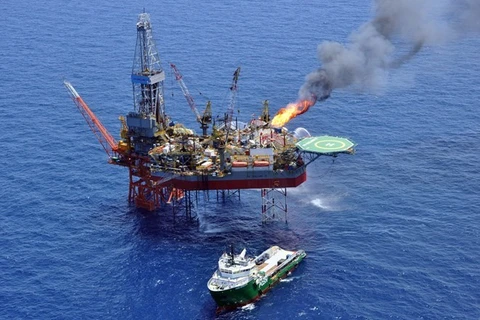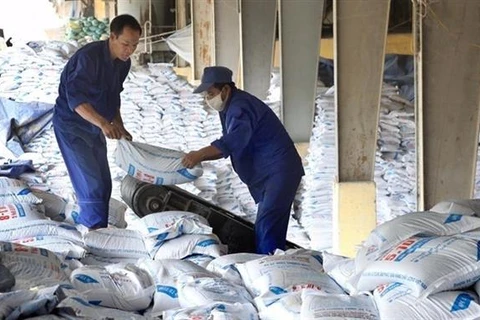 The PetroVietnam Ca Mau Fertiliser Co., Ltd. (PVCFC)’s total urea output reached the milestone 7 millionth tonne on September 13. (Photo: VNA)
The PetroVietnam Ca Mau Fertiliser Co., Ltd. (PVCFC)’s total urea output reached the milestone 7 millionth tonne on September 13. (Photo: VNA) Hanoi (VNA) - The PetroVietnam Ca Mau Fertiliser Co., Ltd. (PVCFC)’s total urea output reached the milestone 7 millionth tonne on September 13 after almost ten years of operations.
A subsidiary of the Vietnam Oil and Gas Group (PetroVietnam) and located in the Mekong Delta province of Ca Mau, PVCFC has maintained capacity at 110 percent over recent years to bring high-quality fertiliser to the market and contribute to enhancing national food security.
The factory has produced some 870,000 tonnes of urea each year, meeting more than 40 percent of demand around the country and holding a market share of approximately 60 percent in the Mekong Delta - Vietnam’s rice bowl.
Its products have been exported to a number of foreign countries, including Cambodia.
With its products, farmers can save up to 30 percent on fertiliser costs while increasing yields by 5-10 percent.
Danish catalysis company Haldor Topsoe named PetroVietnam Ca Mau Fertiliser among the factories with the best annual normalised production and in the Top 10 in terms of the lowest annual specific net energy consumption.
The PVCFC generated 34.73 billion VND (nearly 1.5 million USD) in profit in the first two months of this year, equivalent to 69 percent of its yearly plan, despite unfavourable business conditions.
The company’s output surged 17 percent past the January – February target to 157,000 tonnes of urea.
In the first six months of this year, the prices of gas as material for urea production dropped strongly along with oil prices, enabling the factory to earn 200 billion VND (around 8.65 million USD) in profit, far exceeding the initial target of 54 billion VND, despite being challenged by unfavourable business conditions, in particular severe saline intrusion in the Mekong Delta.
Saltwater has hit the Mekong Delta harder and earlier than expected this year, affecting about 300,000 ha and forcing local farmers to cut their rice-growing areas and shift to aquaculture, with demand for fertiliser falling 15 to 20 percent as a result.
The global spread of COVID-19 has also taken a heavy toll on the export of PVCFC’s urea products to major foreign markets, particularly Cambodia.
To resolve the problems, PVCFC has worked hard to boost sales in areas not affected by saline intrusion, and cooperated with agricultural authorities to provide farmers with technical support and new varieties to cushion the blow of drought and saltwater intrusion.
It has partnered with the Mekong Delta province of Soc Trang to demonstrate new high-quality paddy varieties and advanced farming practices, and instructed farmers on how to use water and fertiliser effectively and how to test salinity.
The company has signed an agreement with VietFarm to develop bio-fertilisers and organic fertilisers, to diversify its products and stay abreast of higher market demand and modern agricultural trends.
According to the company’s Deputy Director General Nguyen Thi Hien, PVCFC is applying many technological solutions to raise the factory’s capacity by 15 percent, which means total urea output is expected to reach 913,000 tonnes in 2021. As such, the company will have to expand its share in the domestic market while seeking new export markets.
The company raised nearly 1.58 trillion VND (74 million USD) at its initial public offering on the Ho Chi Minh Stock Exchange (HoSE) in 2014.
It successfully sold all 129 million shares offered in the IPO at an average price of 12,251 VND, or 251 VND higher than the initial price. The shares account for 24.36 percent of the company’s capital.
The company made its debut on HoSE on March 31, 2016, with more than 529 million shares offered at a reference price of 14,500 VND./.
VNA






















